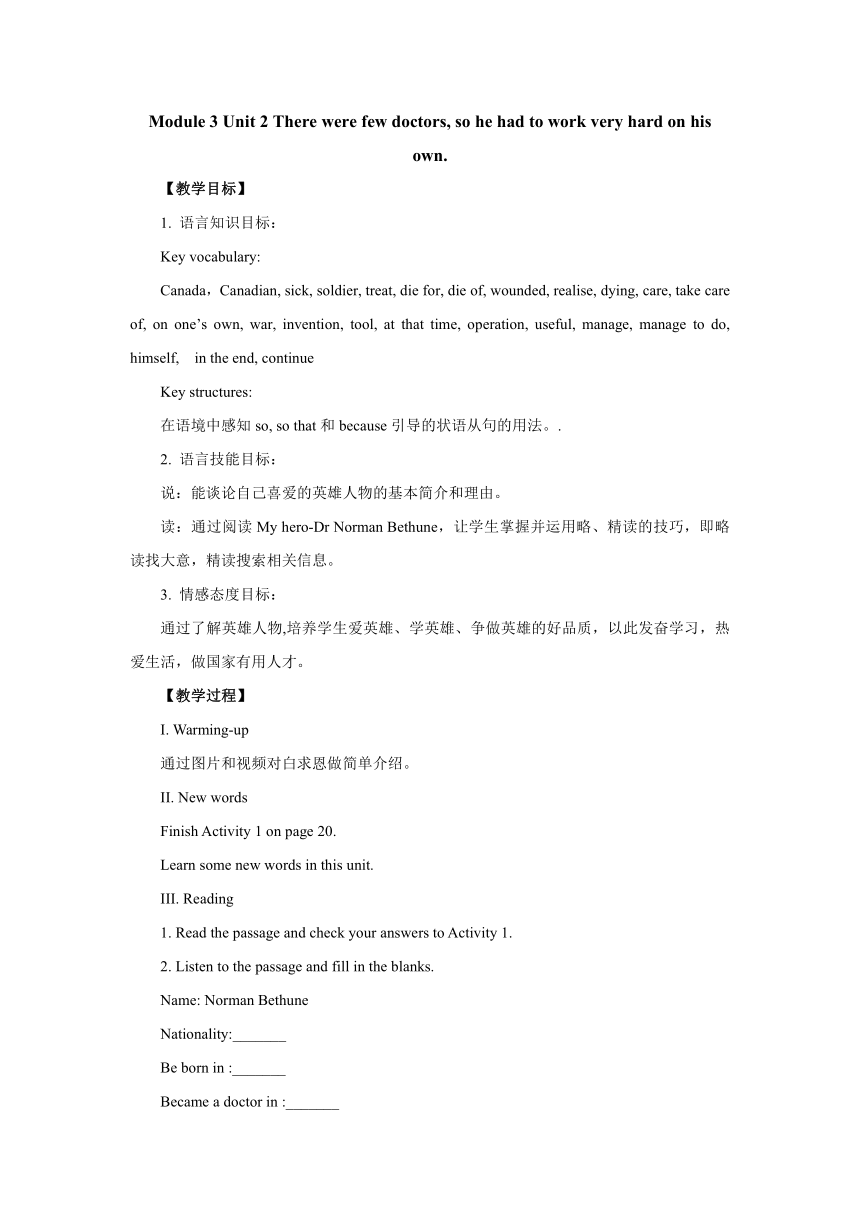
Module 3 Unit 2 There were few doctors, so he had to work very hard on his own. 【教学目标】 1. 语言知识目标: Key vocabulary: Canada,Canadian, sick, soldier, treat, die for, die of, wounded, realise, dying, care, take care of, on one’s own, war, invention, tool, at that time, operation, useful, manage, manage to do, himself, in the end, continue Key structures: 在语境中感知so, so that和because引导的状语从句的用法。. 2. 语言技能目标: 说:能谈论自己喜爱的英雄人物的基本简介和理由。 读:通过阅读My hero-Dr Norman Bethune,让学生掌握并运用略、精读的技巧,即略读找大意,精读搜索相关信息。 3. 情感态度目标: 通过了解英雄人物,培养学生爱英雄、学英雄、争做英雄的好品质,以此发奋学习,热爱生活,做国家有用人才。 【教学过程】 I. Warming-up 通过图片和视频对白求恩做简单介绍。 II. New words Finish Activity 1 on page 20. Learn some new words in this unit. III. Reading 1. Read the passage and check your answers to Activity 1. 2. Listen to the passage and fill in the blanks. Name: Norman Bethune Nationality:_____ Be born in :_____ Became a doctor in :_____ Came to China in:_____ 3. Read and number the events about Norman Bethune in the order they happened. a came to China b wrote books about ways of treating the sick in China c was born in 1890 d invented medical tools to use outside hospitals e died f went to treat the wounded soldiers in Spain 4. Read the passage again and answer the questions. (so that用法) 1) Why did he go to China during the Anti-Japanese War 2) Why did he invent special medical tools to use outside hospitals 3) Why did he develop training courses for local doctors and nurses, and wrote books 5. Finish Activity 4 on page 21. IV. Language points 1. He came to China to help the Chinese people and died for them. die for 意为“为……而死”。 die of 意为 “因……而死”(原因多来自内部如情感、冻饿、生病等), 其后跟hunger, cold, illness, old age, a fever, heat等名词。 die from 意为“由于……而死”(外因) (原因常来自外部创伤、交通事故), 其后常跟wound, accident, over work, carelessness, drinking 等名词。 e.g. He died of lung cancer. 他死于肺癌。 The man died from a car accident. 这个男人死于一场交通事故。 He would rather die for his belief. 他宁愿为他的信仰而死。 2. He soon realised that many people were dying because they did not get to hospital quickly enough. realize v. 了解; 意识到 表示认识到或承认某事物属实。 e.g. He doesn’t seem to have realized how serious the matter is. realise还有“实现”的意思, 指实现梦想、计划、希望等。 e.g. At last Mr. Smith realised his plan to spend a holiday in China. dying是die的-ing形式, 常用做形容词,意思是“垂死的; 即将死亡的”, 常用做表语或定语。 e.g. The old man is dying. The doctor tried to save the dying boy. 辨析:die是短暂性动词, 意为“死亡”, 指生命的结束, 强调“死”的动作。 death是die的名词形式, 意为“死亡”。 dead是形容词, 意为“死的”, 通常和be动词连用, 表示状态。 3. Dr Bethune developed new ways of taking care of the sick. take care of 照顾; 护理 e.g. Don’t worry. I’ll take care of you. 别担心。我会照顾你 ... ...
~~ 您好,已阅读到文档的结尾了 ~~